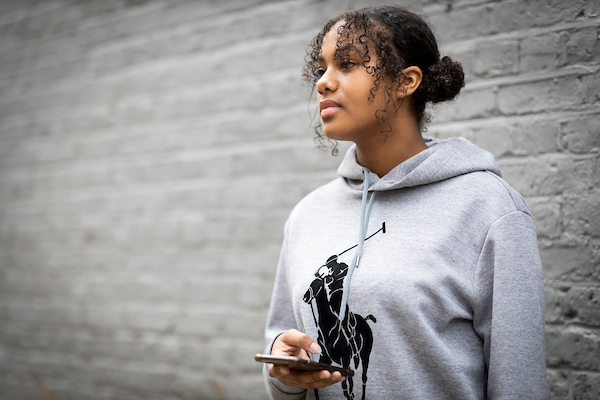Types of therapy
If you're having problems with any kind of emotional or mental health issue, there are many different types of therapy that could help. Here's our at-a-glance guide to what’s available and how to get telephone or online counselling free right here at The Mix.

What is an abusive relationship?
What is therapy?
Therapy or talking treatment is a capture-all term that means any form of support or talking with a trained professional about your thoughts, feelings, behaviour or life experiences. The aim of this kind of therapy and counselling is to give you a safe time and place to talk about what you’re experiencing without judgement. This is typically done with a therapist or counsellor, so that you can get advice, tips and treatment to help you understand, leave in a better place or leave with better coping mechanics. It can be a really effective way of dealing with difficult times in your life and can help you to process emotions. Online therapy is much the same, but taking place via Skype, Zoom or another similar platform.
Therapy can be useful for:
- Overcoming depression or anxiety
- Dealing with difficult life events such as bereavement or redundancy
- Dealing with common relationship problems
- Processing traumatic or upsetting experiences, either recently or in the past
However, you don’t have to wait until you’re at a crisis point before talking to someone. It’s ok to try therapy at any point in your life. It can help with your mental health and wellbeing even when you feel totally fine. Also, remember that finding a therapist isn’t the only form of treatment for mental health problems. Medical treatments such as antidepressants are also widely used by mental health services, either alone or together with talking treatments.
What are the different types of therapy?
Therapy comes in a few different forms, here’s an overview of the most common ones:
1. Counselling or psychotherapy
Therapists trained in counselling or psychotherapy can have varied backgrounds or approaches. However, both ultimately offer an opportunity to talk about your life and any problems you have.
During a session you might just want to vent about something that’s bugging you. Or, you might go deeper by examining your childhood or your relationships.
The sessions should help you understand the reasons you feel or behave a certain way. They should also mean you’re in a better place to change the things in your life you’re not happy with.
This type of therapy is usually face-to-face but can also take place over the telephone or via the internet.
We answer all your common questions about counselling in our FAQ article.
2. Cognitive behaviour therapy or CBT
CBT is an approach used by lots of therapists and is the most common form of therapy offered by the NHS for things like anxiety and depression. It works by examining your thoughts and how they affect your behaviour.
For example, if you’re someone who tends to overthink situations to the point of obsession, CBT can help you think more rationally and break the cycle of overthinking. It helps you to identify patterns of negative or inaccurate thinking and challenges false beliefs.
We have an article about cognitive behavioural therapy here.
3. Group therapy and support groups
Group therapy typically means six to ten individuals meeting face-to-face with a trained group therapist. The group is a safe environment where members are encouraged to talk personally and honestly. The aim of group therapy is to create an environment of trust, but also show that people aren’t alone and that there is both help and hope.
Support groups can be a great way to find out that other people are in a similar position and that there is help out there. It can be very useful to share experiences with other people in the same situation as you.
Group therapy or support groups are all about trust and mutual, or peer, support.
4. Relationship counselling and family therapy
Relationship counselling is a form of support designed to help couples cope with difficulties in their private life. The aim is to examine and decide how best to move forward from relationship difficulties.
Family therapy is very similar to relationship counselling, but the emphasis is on helping parents achieve workable arrangements for their children. Learn more about family therapy here.
How to get therapy
Your doctor can help you get access to the right talking therapy for you. Unfortunately, there are sometimes long waiting lists for these types of treatments on the NHS.
There are a number of charities and organisations that provide free or low-cost counselling including The Mix.
How to get online counselling free
Did you know The Mix also offers a free online counselling service via webchat? You can also speak to our counsellors over the phone too. We’ve also created a guide on what to expect from counselling at The Mix.
Alternatively, Google for organisations in your area and search on The British Association for Counselling and Psychotherapy for accredited private therapists in your area.
- Mind offers advice and support to people with mental health problems. Their helpline runs nine to six from Monday to Friday. 0300 123 3393
- SANE offers support and information to people affected by mental illness. Call their helpline on 0300 304 7000, open 4:30pm – 10:30pm every day.
- Chat about this subject on our Discussion Boards.
- Need help but confused where to go locally? Download our StepFinder iPhone app to find local support services quickly.
Next Steps
- Mind offers advice and support to people with mental health problems. Their helpline runs nine to six from Monday to Friday. 0300 123 3393
- SANE offers support and information to people affected by mental illness. Call their helpline on 0300 304 7000, open 4:30pm - 10:30pm every day.
- Chat about this subject on our Discussion Boards.
By Ally Thomas
Updated on 10-Mar-2023
No featured article














